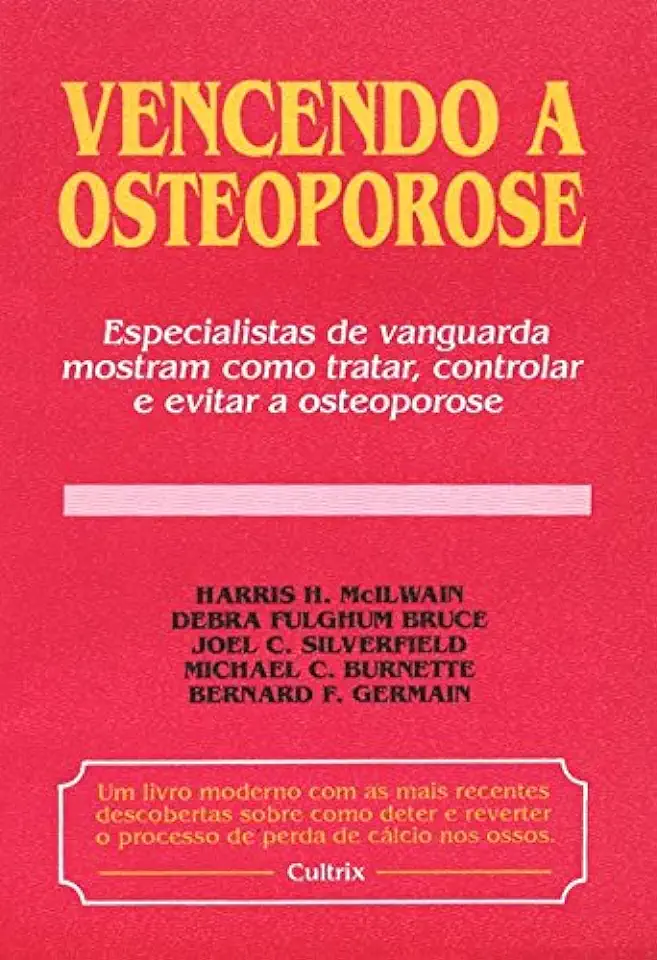
Overcoming Osteoporosis - Harris H. Mcilwain
Overcoming Osteoporosis: A Comprehensive Guide to Building Bone Health and Preventing Fractures
Introduction
Osteoporosis is a common bone disease that affects millions of people worldwide. It is characterized by a decrease in bone density, which can lead to an increased risk of fractures. While osteoporosis is often associated with aging, it can also affect younger people.
In his book, "Overcoming Osteoporosis," Dr. Harris H. McIlwain provides a comprehensive guide to building bone health and preventing fractures. Dr. McIlwain is a leading expert in the field of osteoporosis and has helped thousands of people improve their bone health.
What Causes Osteoporosis?
Osteoporosis is caused by a combination of factors, including:
- Genetics: Some people are more likely to develop osteoporosis than others due to their genes.
- Age: As people age, their bones lose mass and become weaker.
- Menopause: Women who have gone through menopause are at an increased risk of osteoporosis due to the decrease in estrogen levels.
- Certain medications: Some medications, such as corticosteroids and thyroid hormone replacement therapy, can cause osteoporosis.
- Medical conditions: Certain medical conditions, such as Cushing's syndrome and diabetes, can also lead to osteoporosis.
Symptoms of Osteoporosis
Osteoporosis often does not cause any symptoms in its early stages. However, as the condition progresses, people may experience:
- Back pain
- Bone fractures
- Height loss
- Kyphosis (a humpback)
- Tooth loss
Diagnosing Osteoporosis
Osteoporosis is diagnosed with a bone density test. This test measures the amount of calcium and other minerals in the bones. A bone density test can be done on the hip, spine, or forearm.
Treating Osteoporosis
There are a number of treatments available for osteoporosis, including:
- Calcium and vitamin D supplements: Calcium and vitamin D are essential for bone health. People with osteoporosis should take supplements of these nutrients if they are not getting enough of them from their diet.
- Bisphosphonates: Bisphosphonates are a type of medication that helps to slow down bone loss. They are the most common type of medication used to treat osteoporosis.
- Other medications: Other medications that can be used to treat osteoporosis include teriparatide, raloxifene, and strontium ranelate.
- Lifestyle changes: There are a number of lifestyle changes that people with osteoporosis can make to improve their bone health, including:
- Exercising regularly
- Eating a healthy diet
- Maintaining a healthy weight
- Quitting smoking
- Limiting alcohol intake
Preventing Osteoporosis
There are a number of things that people can do to prevent osteoporosis, including:
- Getting enough calcium and vitamin D: Calcium and vitamin D are essential for bone health. People should get the recommended amount of these nutrients from their diet or through supplements.
- Exercising regularly: Exercise helps to build bone mass and strength. People should get at least 30 minutes of moderate-intensity exercise most days of the week.
- Eating a healthy diet: A healthy diet includes plenty of fruits, vegetables, and whole grains. These foods provide the nutrients that bones need to stay healthy.
- Maintaining a healthy weight: Being overweight or obese can increase the risk of osteoporosis. People should aim to maintain a healthy weight for their height and age.
- Quitting smoking: Smoking can damage bones and increase the risk of osteoporosis. People who smoke should quit as soon as possible.
- Limiting alcohol intake: Excessive alcohol intake can interfere with calcium absorption and lead to bone loss. People should limit their alcohol intake to two drinks per day for women and three drinks per day for men.
Conclusion
Osteoporosis is a serious condition, but it can be prevented and treated. By following the advice in this book, you can improve your bone health and reduce your risk of fractures.
Call to Action
If you are concerned about osteoporosis, talk to your doctor. They can help you determine your risk of osteoporosis and recommend the best course of treatment for you.